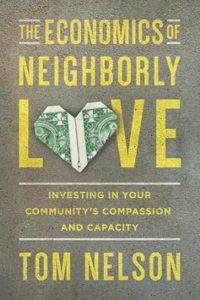The Economics of Neighborly Love: A Synopsis
 JOEY OTT
JOEY OTT
Network Manager
Read more from Joey
Listen to this article:
Jump to:
The Purpose of the Book | The Perspective | The Key Points | Details We Love | Considerations | Who Should Read This?
As a child, Pastor Tom Nelson wrestled with the disconnect of growing up in a materially impoverished reality while pursuing a flourishing faith. As an adult, he became a pastor and realized that economics and faith should go hand in hand in the pursuit of human flourishing and the pursuit of loving our neighbors. Nelson believes we are called to be stewards of God’s creation and that it’s important to learn stewardship over all areas of life. This book aims to provide a space for those conversations.
In Nelson’s words, “I am delighted that so many have recently written on the deep and significant connections between faith and work, making the case that our individual work truly matters to God and to our neighbors. Yet while our personal vocations do, of course, matter a great deal, they are by no means the entire story. Our work always takes place within larger economic realities; we are part of a much bigger story.”
Often there is a large separation between conversations of faith and conversations of economics in what the role of money, work, and free markets have in the Christian faith. But shouldn’t these go hand in hand? As a pastor, Nelson has conversations with many people in his congregation asking how they should navigate the economic realities of capacity, wealth, and value, and he guides them with biblical principles.
This book reflects the complexity of human flourishing, generosity, and poverty, and how to understand those from a biblical perspective.
1. The Pursuit of Human Flourishing
“We were created with community in mind. We were created to flourish, to be fruitful, and to add value to others in the world.”
Nelson talks about the pursuit of human flourishing as a pursuit of overall well-being, peace, and joy in every aspect of life. We often see this expressed through healthy relationships with others and God, as well as the opportunity to create value for ourselves and others. It’s important when trying to help people flourish that we remember both how vital relationships are to every human being and that a flourishing life is a fruitful life that in turn aids in the flourishing of others.
Nelson focuses a lot of attention on the “Sunday-to-Monday” gap. He says, “I believe the wind of the Spirit is blowing across our nation and the globe, stirring up churches and church leaders to strategically address the Sunday-to-Monday gap, to more passionately and intentionally bring faith, work, and economics together in a seamless fabric of missional faithfulness and fruitfulness.”
2. Generosity
“Stewardship is not a subcategory of the Christian life. Stewardship is the Christian life.”
This book points to three main concepts to consider with your generosity.
3) The local church is plan A for the world.
Often when we talk about money, we humbly talk about what God has blessed us with. What if instead we thought about finances as what God has entrusted us with?
In this book, Nelson encourages the church to live with an understanding that God is the giver of all good things and has entrusted us to be good stewards of creation. The author emphasizes that God puts a radically important calling on our financial decisions to reflect and honor that calling of stewardship. Consequently, we should be quick to consider how we can support God-honoring work, whether that be your church or a local gospel mission. We should make these things priority number one of our budgets, and not an afterthought.
Finally, Nelson alludes to the concept of subsidiarity in his belief that investment in the local church is the best route toward human flourishing: “[L]ocal churches are able to establish an ongoing faithful presence in a community that transcends any one individual. This faithful presence allows for the continued fulfillment of the church’s mandate to be salt and light in a particular cultural context.” Solutions closer to home provide a personal relationship that large-scale solutions simply can’t replicate.
3. Poverty
“The image of a common table should shape our engagement with the materially impoverished. There are no vertical relationships at a common table, only horizontal interactions. As image bearers of God, humans are to extend neighborly love on a level playing field—person to person, not helper to helped.”
Poverty is so much more complex than a lack of resources, so the solutions and paths to aid those in poverty are much more complex than gifting resources. There can often be a poverty of spirit, a poverty of relationships, a poverty of direction. These problems can’t be solved by material means, so we must look to different avenues if we want to love neighbors who are experiencing poverty.
Nelson observes that, “Short-term, quick-fix solutions to poverty may alleviate guilt or overcome initial inertia, but they do not work when it comes to addressing the complex and systemic dimensions of poverty. Often quick fixes do more harm than good.”
Nelson understands the complexity of poverty and communicates well that complex issues take complex, long-term solutions. He believes in a local church solution that affirms the dignity of those being helped. His robust conception of human flourishing is not merely material, but The Precognizes that flourishing comes from meaningful relationship, meaningful work, and peace and hope sourced in God.
We also appreciate the way Nelson encourages the reader toward generosity. The reality is that not everyone has the time and talent to serve people in poverty as a vocation, but anyone can take part in effective and uplifting solutions by generously investing in effective churches and charities. Nelson’s conception of stewardship makes readers account for their allocation of finances, relationships, work, and time.
As a pastor, Tom Nelson is writing much of this book in how economics relates to the church. However, nonprofit workers and those running outreach missions can also benefit from these lessons. Though secular organizations are not the primary focus of the book, a lot of sound economic insight can be applied to determine the relative efficacy of secular organizations.
Also important to consider is that while Nelson encourages a heart of generosity, he does not go into detail on how to give in a way that empowers the individual being served; his primary response is to support the local church. He briefly touches on creating value through exchange but leaves out the importance of challenge in a charitable context, as his primary focus is not developmental charity work.
This book is written for Christians and church leaders wanting to ask questions and be advised on how to navigate the world of economics. It equips pastors to lead their congregations in God-honoring stewardship. It would also benefit donors who want a deeper understanding of how to steward the finances that God has entrusted to them.
The Economics of Neighborly Love can be purchased at Amazon. If you purchase the book through this link, True Charity will earn a small amount as an Amazon Associate

This article is just the tip of the iceberg for the practical resources available through the True Charity Network. Check out all of the ways the network can help you learn, connect, and influence here.
Already a member? Access your resources in the member portal.




